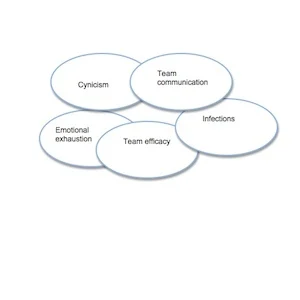The high risk of burnout in ICU staff is well-known as is the high rate of healthcare-associated infections. Evidence is emerging of an association between staff burnout and healthcare-associated infections (HAIs), when high levels of stress may lead to less attention to infection control. The effect of burnout on teamwork and indirectly on infections has been shown in a study from Italy, published in Intensive and Critical Care Nursing, which offers preliminary evidence that burnout may be related to hospital infection as a result of team dynamics.
Maura Galletta, from the Department of Public Health, Clinical and Molecular Medicine, University of Cagliari in Italy, and colleagues studied job-related burnout levels, and investigated how emotional exhaustion and cynicism (core components of burnout) were associated with some psychosocial factors (e.g. perceived team communication and team efficacy) and HAIs. 130 professionals working in 5 critical care units completed a questionnaire. Infections data was collected for 6 months.
See Also: Physician Burnout is Worsening
The researchers had three hypotheses:
Hypothesis 1. Emotional exhaustion is positively related to cynicism.
Hypothesis 2. Quality of team communication mediates the relationship between cynicism and team efficacy.
Hypothesis 3. Team efficacy is negatively related topatient infections.
The researchers conclude that burnout does have an indirect effect on healthcare-related infections as a result of the quality of teamwork. “Reducing burnout can be a good strategy to decrease infections, thus increasing workers’ well-being while improving patient care”, they write.
Maura Galletta, from the Department of Public Health, Clinical and Molecular Medicine, University of Cagliari in Italy, and colleagues studied job-related burnout levels, and investigated how emotional exhaustion and cynicism (core components of burnout) were associated with some psychosocial factors (e.g. perceived team communication and team efficacy) and HAIs. 130 professionals working in 5 critical care units completed a questionnaire. Infections data was collected for 6 months.
See Also: Physician Burnout is Worsening
The researchers had three hypotheses:
Hypothesis 1. Emotional exhaustion is positively related to cynicism.
Hypothesis 2. Quality of team communication mediates the relationship between cynicism and team efficacy.
Hypothesis 3. Team efficacy is negatively related topatient infections.
Results
Nurses made up 3/4 of the sample, and physicians the rest. The analysis of the questionnaire data showed that emotional exhaustion was related to cynicism due to high work demands: the more workers are exposed to emotional depletion, the more they will lose enthusiasm and emotional involvement in their job. The results showed that team communication was positively related to team efficacy and that cynicism affected team communication. The researchers explain that “this means that a work situation that contributes to a chronic depersonalisation,namely the distance from one’s work, decreases a team’s ability to collaborate, share critical information and pre-vent errors, thus affecting the sense of team effectiveness.” Lastly, perceived team efficacy was found to be directly and negatively related to patient infection acquired during their hospital stay. The researchers write that this result denotes that “when a team works in a synergic and collaborative way, in which communication among staff members is effective, this will result in an increased quality of patient care, thus reducing health care associated-infections.”The researchers conclude that burnout does have an indirect effect on healthcare-related infections as a result of the quality of teamwork. “Reducing burnout can be a good strategy to decrease infections, thus increasing workers’ well-being while improving patient care”, they write.
Recommendations
The researchers recommend developing management strategies to reduce emotional exhaustion and cynicism and promote an individual’s well-being. They suggest that these include strategies to reduce workers’ workload, especially when it is difficult to hire new staff due to economic or regulatory restrictions. This could include temporarily reducing workload by providing employees the opportunity to have flexible work programmes and achievable clinical objectives, they write. They also recommend improving quality of communication among all team members to foster group cohesion and interaction, thus increasing their efficacy on patients.References:
Galletta M, Portoghese I, D'Aloja E, Mereu A, Contu P, Coppola
RC, Finco G, Campagna M (2016) Relationship between job burnout, psychosocial factors and health care-associated infections in critical care units. Intensive Crit Care Nurs, 34:51-8. doi:
10.1016/j.iccn.2015.11.004. Epub 2016 Mar 5.
Latest Articles
Burnout, healthcare-associated infections, teamwork
The high risk of burnout in ICU staff is well-known as is the high rate of healthcare-associated infections. Evidence is emerging of an association between staff burnout and healthcare-associated infections (HAIs), when high levels of stress may lead to l










